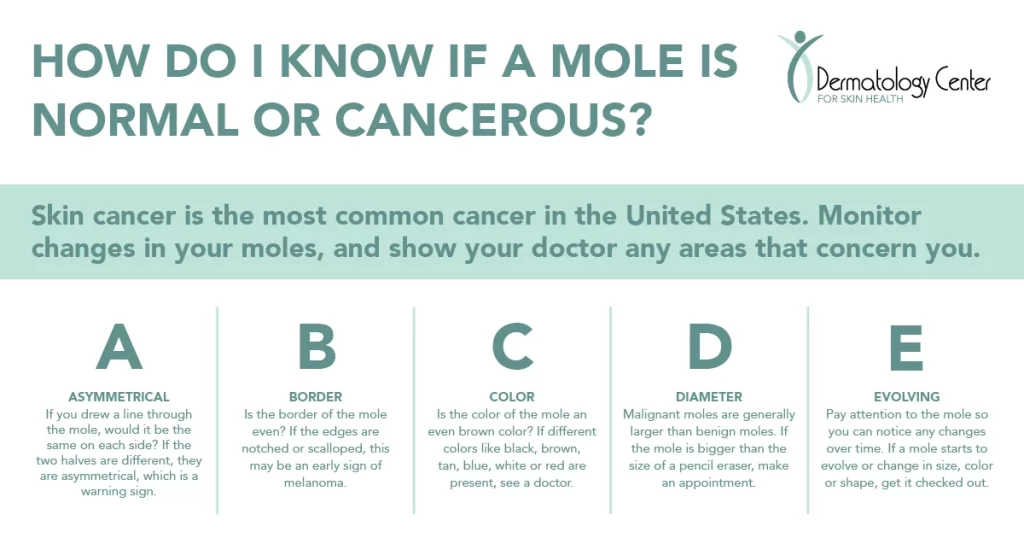The most common type of cancer is skin cancer. It affects more than one million Americans every year, leaving one in five American to develop skin cancer during their lifetime. If caught early, skin cancer can be treated.
Skin cancer is the out-of-control growth of abnormal cells in the epidermis, the outermost skin layer. Unrepaired DNA damage causes mutations to occur. The two leading causes of skin cancer are the sun’s harmful UV rays and the use of tanning machines. Continue reading below for helpful tips to prevent skin cancer.
SKIN CANCER PREVENTION
Be more aware of the changes in your skin to detect skin cancer. Here are some signs of being mindful of:
- Large brown spots with darker speckles
- Dark lesions on the hands, feet, mouth, genitalia, or nose
- Translucent dome-shaped growths
- Existing moles that grow, itch, or bleed
- Brown or black streaks under the nails
- A sore that repeatedly heals and reopens
- Clusters of slow-growing scaly lesions that are pink or red
The American Academy of Dermatology has developed the following ABCDE guide for assessing whether or not a mole or other lesion may be becoming cancerous.
- Asymmetry: Half of the mole does not match the other half in size, shape or color
- Border: The edges of moles are irregular, scalloped or poorly defined
- Color: The mole is not the same color throughout
- Diameter: The mole is usually higher than 6 millimeters when diagnosed but may also be smaller
- Evolving: A mole or skin lesion that is different from the rest or changes in size, shape or color

FOUR STEPS TO PREVENT SKIN CANCER
Specific individuals are more prone to develop skin cancer. Certain skin conditions can mask skin cancer. Additionally, if you feel your child has a mole that should get checked, don’t hesitate to make an appointment. A mole can be considered normal, but it is vital to know the difference between cancerous and non-cancerous moles. For example, one warning sign of melanoma is the addition of a mole you haven’t seen before.
If you notice any unusual signs or changes with your skin, contact a dermatologist today.
Roughly 90 percent of non-melanoma cancers are attributable to ultraviolet radiation from the sun. That’s why prevention involves covering up or staying out of the sun.
Four steps to prevent skin cancer:
- Wear protective clothing. Cover up your arms and legs with protective clothing along with wearing a wide-brimmed hat and sunglasses.
- Avoid UV radiation. The sun’s peak hours, where it is the strongest, takes place from 10 a.m. to 4 p.m. It is recommended to seek out shaded areas and avoid direct sunlight. These actions minimize your chances of accumulating immediate UV ray exposure. Additionally, do not utilize tanning beds. A tanning bed is a carcinogen, a substance that promotes cancer. Any form of UV light exposure can also cause melanoma to form.
- Use the proper sunscreen for your skin type year-round. You know to use sunscreen during the hotter months of summer, but you also need to use it routinely as it gets colder outside as well – yes, even during winter. Use broad-spectrum sunscreen year-round with an SPF of 30 or higher that works on both UVA and UVB rays. There are many choices when it comes to sunscreens and sunblocks. Between chemical sunscreens and physical sunscreens, it is valuable for you to choose the best fit for you and your skin type. Make sure you read the sunscreen label correctly based on your personal preferences.
- Get regular skin examinations. Schedule and attend regular skin exams. Adults over the age of 40 receive an annual review with a dermatologist. Monthly skin checks with your dermatologist if you notice any chances is essential to stop a pre-cancerous sign before it develops.
Bonus tip: Don’t trust an app to determine if you have skin cancer or not. While they can have characteristics for being helpful, always trust a trained medical professional’s opinion over an app.
HEAR FROM A PATIENT: DIAGNOSING MELANOMA
Donna Ricciuti started going to the Dermatology Center in 2006. When she first started seeing Dr. Maouad, Donna felt comfortable with her as if she had “known her her whole life.” When she came in for a routine visit, Dr. Maouad noticed two moles on Donna’s back that appeared suspicious. After tests were run, Dr. Maouad called Donna in for an appointment to discuss how she caught early stages of melanoma forming.
“She told me I was going to be okay, and I believed her,” said Donna. “If there’s something, she’s going to take care of it. I’m not worried. I’m not afraid. She saved my life and I’ll always appreciate that from her.”
LET US HELP YOU | THE DERMATOLOGY CENTER FOR SKIN HEALTH, PLLC
The Dermatology Center for Skin Health, PLLC, provides compassionate and quality skincare for all ages. Our services range from acne, cosmetic procedures, preventive care to skin cancer, and more.
We have a staff that works together as a team. We are responsive to your needs and keep you informed about your health issues and options.
Our priority is to deliver quality care to informed patients in a comfortable and convenient setting. When you have skin problems, turn to a dermatologist who listens and responds. Our staff will meet your needs and provide you a dedicated team of trained professionals who give you the individualized attention you deserve.
If you are concerned with an area, please call us at 304-598-3888 to make an appointment to see one of our dermatologists right away. Based on the doctor’s assessment, you will be provided with the appropriate treatment plan if needed. The Dermatology Center for Skin Health, PLLC, also provides full body skin evaluations.


